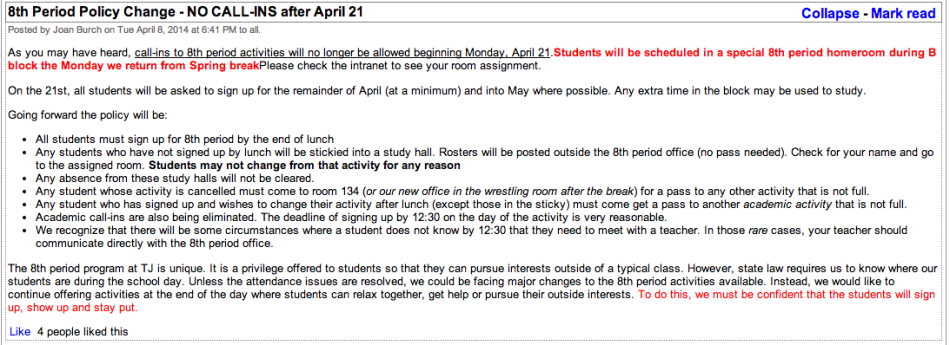Eighth period office implements changes to call-in system
On April 8, eighth period coordinator Joan Burch posted an announcement on Intranet detailing the new changes made to the call-in system.
April 14, 2014
The eighth period office has made changes to the sign-up system that will be in effect immediately after spring break. These changes will not only eliminate call-ins, but also include sticky study halls for students who fail to sign up for eighth period by the end of lunch. Absences in this study halls will also not be cleared.
These changes are a result of an incredibly high number of call-ins and failures on the part of the students to sign up for their activities. Every red and anchor day, approximately 400 changes are made after Intranet sign-ups close. Each block includes about 140 students who get called in by teachers for not signing up for an activity, and hundreds more students who need to change their selections for a variety of reasons.
The goal is to shift responsibility to the students and away from the teachers.
“The call-in policy is not really changing from its original purpose,” eighth period coordinator Joan Burch said. “Instead, we are really just enforcing the 12:30 p.m. deadline for sign up and shifting the responsibility back to our very capable students.”
The changes will re-emphasize the 12:30 p.m. deadline, especially as students have resorted to not signing up by then and later asking to be called-in to activities. Originally, call-ins, which were simplified two years ago when the system become automated, were for teachers whenever they needed to meet with students for academic purposes. Unfortunately, the result was a large number of students who weren’t signed up by the deadline.
“This shifts the responsibility for signing up for eighth period from the student to the teacher, which places an unfair burden on the teachers,” Burch said. “The time spent managing attendance and call-ins takes away from the time teachers can work with students.”
The process to approve the changes was not simple, involving a meeting between principal Evan Glazer, the three assistant principals, Director of Student Activities Rusty Hodges, Director of Student Services Brandon Kosatka and all four of the division managers.
Administrators believe that the changes are necessary to ensure that all students can be located at all times, as is required by state law.
“The eighth period program at TJ is unique,” Burch said. “It is a privilege offered to students so that they can pursue interests outside of a typical class. Unless the attendance issues are resolved, we could be facing major changes to the eighth period activities available. Instead, I would like to continue offering activities at the end of the day where students can relax together, get help or pursue their outside interests.”
Though students may feel burdened by the changes, some believe that the reasons are justified.
“I think that the school’s concern is very legitimate — they have to know by law where their students are at all times,” freshman Susanna Bradbury said. “I’m sure that previous to this rule going into effect, not all students were always accounted for at all times during eighth periods.”
To senior José Acuna, the changes will also allow him to grow more responsible.
“I can no longer depend on my teachers to call me every red day, which is probably a bad thing at first, but in the end, it’s good because it will hold me accountable for forgetting, so it’ll further encourage the importance of responsibility,” Acuna said. “It’s nice that they won’t give you an absence and they put you into a study hall, and still let you change your activity if you already signed up for one.”
However, since others are accustomed to making choices after 12:30 p.m., they believe that the changes will limit their freedom.
“The 8th period staff do get to find out where students are at all times, but then nobody has the freedom to make a last-minute change if they wanted or needed,” sophomore Joyce Hong said. “It really limits our freedom to choose an activity that we want to do, since a lot of decisions are made at the last minute.”
Though students will have to adjust to the new changes, Bradbury thinks that benefits outweigh the drawbacks.
“I think for the most part, though, this new system will provide an incentive for more students to sign up to eighth period beforehand and will enable the school to be a safer place by always accounting for the locations of students at all times,” Bradbury said.






